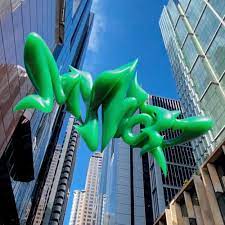
It’s hard to believe that it’s been nearly a year since Aespa’s last release. Oh, they’ve been active–international appearances, sold out concerts, an announcement that they’ll be attending the Cannes Film Festival as brand ambassadors–but it’s been 11 months since the release of their last EP, Girls. Both that long delay for a young group and the reasons why highlight how Aespa’s greatest strength is also a major weakness. When a group is so clearly centered around its concept and fame, it can be a little off-putting for people who are just here for the music.
Thankfully, their new EP, My World, is following in the footsteps of its predecessor by toning that down. This is a much more accessible project for new listeners to jump in on. There are references to their lore, such as the crediting of nævis on the opening track, but it comes off as an in-joke rather than causing continuity lockout. Honestly, the whole EP is a fairly mainstream project, balancing the noisy experimental synths Aespa is known for on the first half with more plaintive tracks on the second. Which, fittingly for Aespa, is both its biggest draw and biggest flaw.
My Word is cut neatly in half, split between Aespa’s signature sound of synths, noise, and chaos incarnate. “Welcome To MY World”, “Spicy”, and “Salty & Sweet ” all flow well into each other, bound together by Aespa’s attitude. They take on the role of modern femme fatales, using their confidence and lack of regard for their partner as a tool of seduction. They present themselves as the challenge, one which many if not most will fail because they hold all the cards. Aespa makes it clear that this is their world, and we’re just living in it.

The dueling senses of danger and authority live and thrive on the impeccable production. Each track takes its own tack on the theme. Opener “Welcome to MY World” is slow and ominous, with the honeyed vocals delivered with the type of cloying sweetness that highlights the teeth just under the surface. “Spicy”, the title track, is a masterclass in deceptively arranged disarray. It pulls from several seemingly disparate influences, including New Jack Swing and psychedelia, but the end result is a fun brag track that is both chaotic and cohesive. “Salty & Sweet” closes the trinity out with a hollow, warped sound, paired with a driving beat and drawn out vocals. It brings back the menace, but revels in the fear rather than concealing it. These three tracks paint Aespa as confident and powerful, where the likelihood of things not ending well is the basis of their appeal.
In the second half, Aespa shift to deconstruct the bravado and egotism of the first. “Thirsty” immediately holds up a mirror to the lust-driven relationships Aespa have been angling for; reminding the audience that passion does not equal compatibility, and cannot sustain a relationship. “I’m Unhappy” is easily the standout of the entire EP. A rumination on the effect of social media, it delves into the toxicity of living for the gram. Disconnected, artificial lives can only lead to insecurity, and Aespa show great bravery in admitting they’re unhappy, but also an unwillingness to dig deeper into that unhappiness. Album closer “‘Til We Meet Again” shows a peaceful and well-meaning severing, promising to remember the good times until they next meet. The fallibility humanizes Aespa and provides a solid dose of reality to counter the aspirational personas of the first half.

The music shifts as well, turning to more R&B influences and stripping down the production a bit. There’s also a lot more space in the mix, giving the vocals the chance to breathe and settle. “Thirsty” is the lightest and brightest track, with twinkling synths over the slightly sour production, matching the fissures in the relationship. “I’m Unhappy” returns to the darkness, this time going for something plaintive, plucky, and off-kilter. It sounds soaked in misery, even on the final verse, belying the truth that the social media detox isn’t enough to fix Aespa’s insecurities, and they’ve returned to their old habit of merely slapping on a smile. It’s unfortunate that this is followed by “‘Til We Meet Again”, which is pretty, but in a generic way. It also lacks the crispness of the rest of the EP.

Which leads back to My Way’s double-edged sword. The production and instrumentation work is impeccable. Every line is sharply defined and perfectly arranged. There are actual levels, so you can hear the various elements rather than being hit with a wall of sound, and it always creates or elevates the tone set by the lyrics. Unfortunately, Aepsa have been turned into servants of that immaculate production. There isn’t really a sense of them or their personality. It almost feels like house music, where the vocals are another instrument for the true artist, the producer, to work with. So while My Way is a solid jumping-on point for newer fans, there isn’t as much to actually pull someone in deeper.
My Way is a very good EP. The lyrics are both escapist and insightful, the music is top-notch, and the production work is fantastic. But there is a lingering sense of anonymity behind it all, that Aespa are the guests rather than the artist.
(Images via SM Entertainment, YouTube)

0 Comments